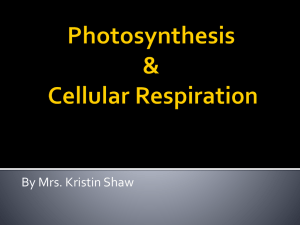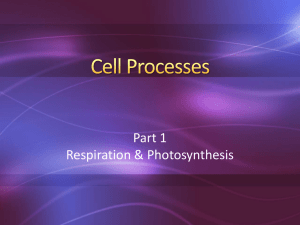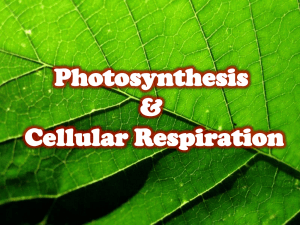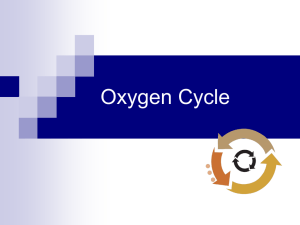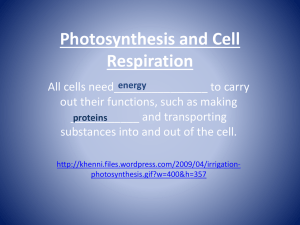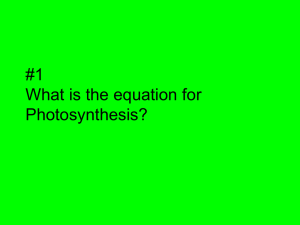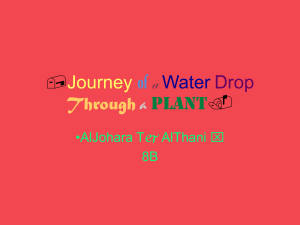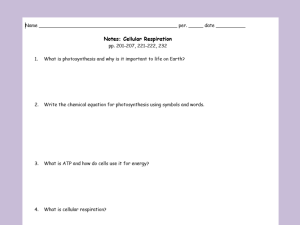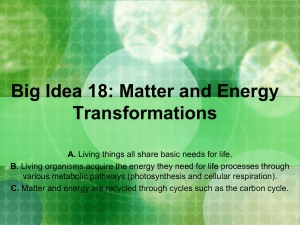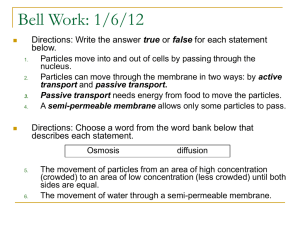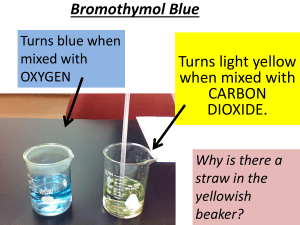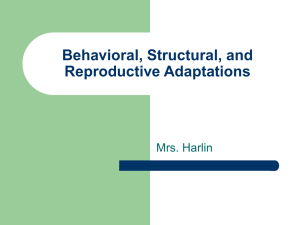Cell Respiration Notes
advertisement
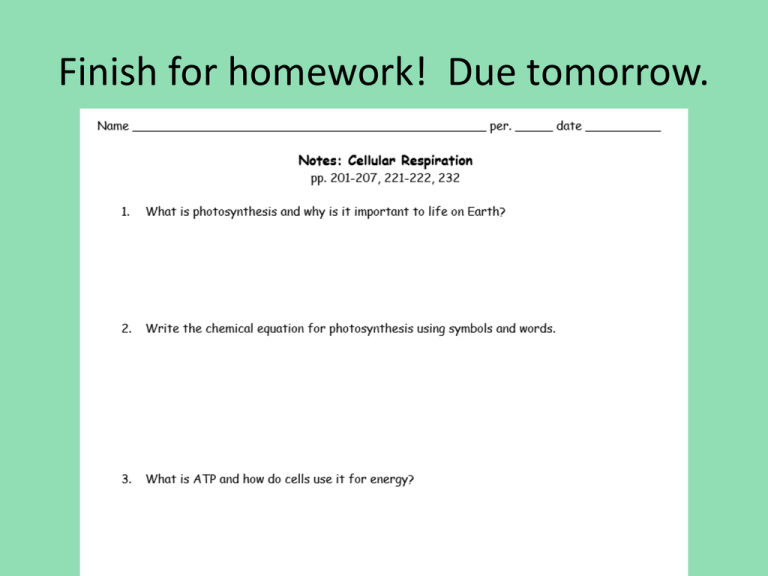
Finish for homework! Due tomorrow. Warm-up 1. Choose lab partner. 2. Take out scratch paper and pencil. 3. If you have one, take out cell phone and set to stopwatch…. Warm-up 1. Add 150 mL bromothymol blue to flask. – Turns blue to yellow in presence of carbon dioxide – Turns yellow to blue in presence of oxygen. 2. Using straw, time how long it takes one person to turn solution yellow. Record time. 3. Pour yellow solution into “Used” jar. Refill with 150 mL of blue solution. 4. Run up & down steps to 2nd floor 8 times! 5. Have same person repeat step 2. time before: __________ time after: __________ Results • Which time was shorter, before or after? • Why did it take less time to change the bromothymol blue to yellow after exercising? • Why was your body producing more carbon dioxide the second time? Notes: Cellular Respiration Essential Questions: 1. How do our cells determine who we are? 2. How do living things obtain and use energy? 1. What is photosynthesis and why is it important to all life on Earth? • Photosynthesis = the way plants use light energy to make food (sugar). • Photosynthesis at beginning of almost all food chains. Without it, food chains would collapse. X X X X X 2. Write the chemical equation for photosynthesis using symbols and words. 6CO2 + 6H2O + (energy) Carbon dioxide water reactants light C6H12O6 + 6O2 glucose oxygen products 3. What is ATP and how do cells use it for energy? • Molecule that stores and releases energy for cells Energy released by breaking bond Between 2nd and 3rd phosphate Energy stored by adding 3rd phosphate 4. What is cellular respiration? • The way cells break down glucose (sugar) to release energy. 5. What is the relationship between cellular respiration, glucose, mitochondria, and ATP? • Glucose = the sugar broken down for energy in cell respiration. • Mitochondria = where cell resp. happens in cells. • ATP = the form of energy cells get from breaking down glucose. 6. Write the chemical equation for cellular respiration using symbols and words. C6H12O6 + 6O2 glucose oxygen 6CO2 + 6H2O + energy Carbon dioxide water ATP 7. Photosynthesis and cell respiration are usually thought of as opposite processes. Explain why this is so. • Photosynthesis produces sugar, cell resp. is breaking down of sugar. • Photosynthesis stores energy, CR releases energy • Chemical reactions are mirror images of each other 8. The Law of Conservation of Matter states that matter cannot be created or destroyed; it can only be rearranged. Explain how the chemical equations for photosynthesis and cell respiration illustrate this. In both cases, we are not creating or destroying atoms; just taking apart molecules and reassembling atoms into different forms. 6CO2 + 6H2O + (energy) C6H12O6 + 6O2 9. Why is it that we die without oxygen? What do your cells do with oxygen that your life depends on? • Cells need oxygen to break down glucose to get energy for life processes. • Cells burn glucose for energy the same way a candle burns wax. Both need oxygen to react…. 10. Summarize the work of a red blood cell as it circulates through your heart, lungs, and brain. Be sure to indicate where gas exchanges of oxygen (O2) and carbon dioxide (CO2) take place. brain 1. RBC goes from heart to lungs. 2. At lungs, RBC gets rid of CO2 , picks up O2. 3. RBC goes back to heart, which pumps it to brain. 4. At brain, RBC gets rid of O2 , picks up CO2. 5. RBC goes back to heart. 6. Repeat cycle lung heart lung rest of body 11. One fundamental principle in biology is the idea that “life runs on sugar.” Apply what you have learned about photosynthesis and cell respiration to explain what this means in your own words. Photosynthesis provides sugar for plants at base of almost all food chains. Cell respiration is how all living things break down sugar for energy. Results • Which time was shorter, before or after? • Why did it take less time to change the bromothymol blue to yellow after exercising? • Why was your body producing more carbon dioxide the second time? Videos Photosynthesis and Cell Respiration (5 min) http://ed.ted.com/lessons/the-simple-but-fascinatingstory-of-photosynthesis-and-food-amanda-ooten How Cells Get Energy (14 min) http://www.youtube.com/watch?v=i8c5JcnFaJ0 Videos What does your pancreas do? http://ed.ted.com/lessons/what-does-the-pancreas-do-emmabryce?utm_source=TED-Ed+Subscribers&utm_campaign=53bd6afe7a2013_09_219_19_2013&utm_medium=email&utm_term=0_1aaccced48-53bd6afe7a46516589 Exit Slip Q: What is cell respiration and why is it important to all life on Earth? A: Your name at bottom
